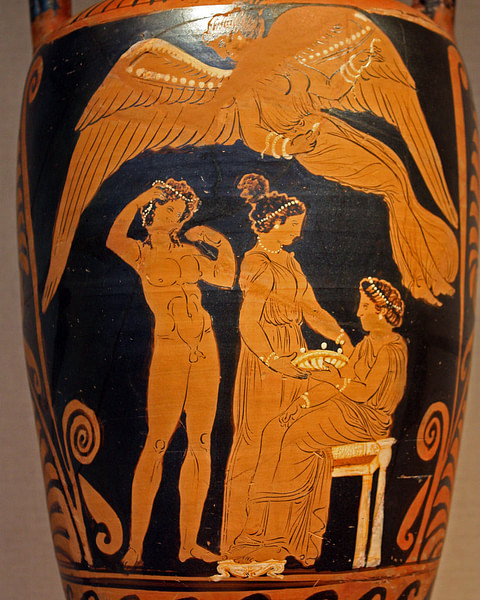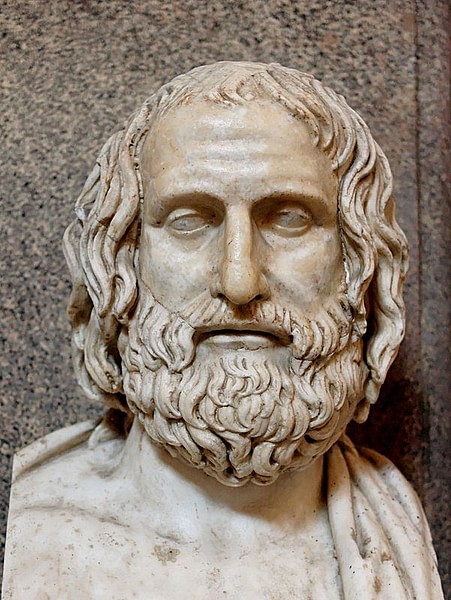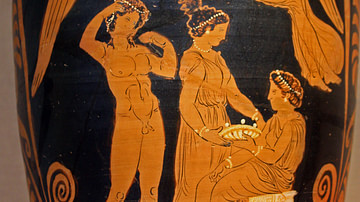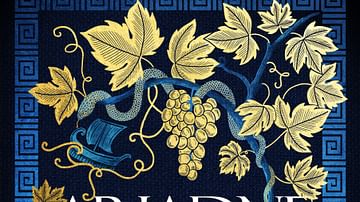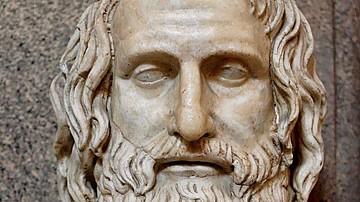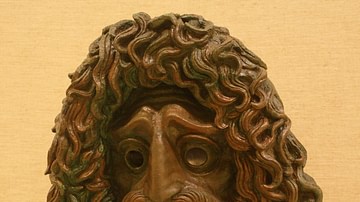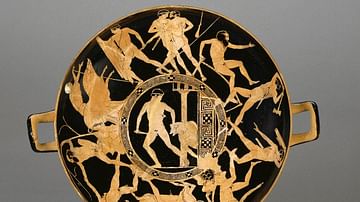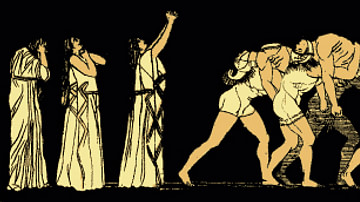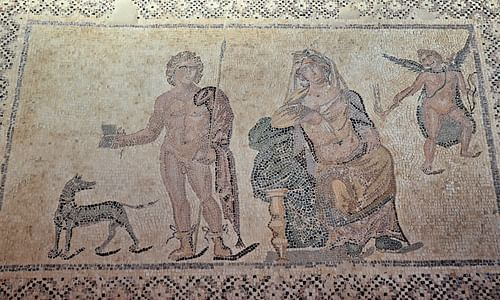
Phaedra is a princess of Crete and the wife of the Greek hero Theseus in Greek mythology. She is one of the main characters in Euripides' (c. 484-407 BCE) Greek tragedy Hippolytus, which recounts how her love for Thesesus' son Hippolytus came to a tragic end.
Phaedra is the daughter of King Minos and Queen Pasiphaë of Crete and the sister of Ariadne, Glaucus, Androgeus, Acacallis, Deucalion, Xenodice, Catreus, and half-sister to the infamous Minotaur. Just like the other females in her family, most notably Pasipahë and Ariadne, a bull plays a pivotal role in Phaedra's story.
Phaedra & Theseus
While Theseus joined fellow Greek hero Hercules in his fight against the Amazons, he kidnapped Hippolyta (some sources mention it was Antiope instead of Hippolyta), causing the Amazons to go to war with Athens. Theseus had a son with Hippolyta, but after the Athenians defeated the Amazons, he married Phaedra.
During Theseus' and Phaedra's wedding, Hippolyta and the Amazons arrived, fully armed and intent on enacting revenge against Theseus. The wedding guests trapped Hippolyta and killed her, while some versions of the myth state that Theseus killed Hippolyta himself in battle. Theseus and Phaedra had two sons together, Acamas and Demophon.
Phaedra & Hippolytus
The most famous myth involving Phaedra is her tragic love for her stepson Hippolytus, which ultimately doomed both of them. This story is told in multiple sources, but most famously in the Greek drama Hippolytus by Euripides and in Seneca's (4 BCE to 65 CE) tragedy Phaedra. Like other myths, there are different variations of the story.
After Phaedra and Theseus were married, Theseus' son, Hippolytus, was sent to King Pittheus, who adopted him as his son and heir to the throne of Troezen. This was done, in part, to stop any rivalry that may have occurred between Hippolytus and his half-brothers over the throne of Athens. Like his mother, Hippolytus showed complete devotion to the goddess Artemis and built a new temple for her in Troezen. Aphrodite was personally offended by his failure to worship her and decided to punish him by making Phaedra fall madly in love with him at the Eleusinian Mysteries.
While Theseus was away, Phaedra followed Hippolytus to Troezen, where she built a temple for Aphrodite which overlooked the gymnasium where Hippolytus exercised naked. Phaedra used her hairpins to poke holes in the leaves of a myrtle tree as a way to vent her frustration. Phaedra kept her desire for Hippolytus a secret, but it was not long before her inner turmoil was reflected on the outside, and her old nurse guessed the truth. She instructed Phaedra to write Hippolytus a letter, confessing her love for him. Phaedra told Hippolytus that she was devoted to Artemis, just as he was. She implored him to visit her so they could go away together and use a hunting expedition as an excuse. She reasoned that because they lived under the same roof, nobody would judge them for the love they had for one another.
Hippolytus was horrified by Phaedra's letter and burnt it in disgust. He visited her chambers and attacked her for her feelings. A helpless Phaedra tore at her clothes and claimed that Hippolytus had attacked her. She wrote a letter falsely accusing Hippolytus of horrible crimes and hung herself. Theseus read Phaedra's note and banished Hippolytus from Athens. He then remembered that he was granted three wishes by his father Poseidon, and he wished for his son to be killed.
Hippolytus left Athens right away. As his chariot travelled along the isthmus, a giant wave suddenly appeared, and a great bull sprang forth, bellowing loudly. Hippolytus' horses reacted in fear, and Hippolytus managed to stop them from galloping off a cliff. However, the bull ran alongside the chariot and caused the reins of the chariot to get caught on the branches of a barren olive tree. The chariot was thrown into the rocks and broke into pieces, while Hippolytus remained tangled in the reins and was dragged to death by his horses.
In other versions of the myth, Artemis told Theseus the truth, which gave him time to travel to Troezen and reconcile with his son before he died. Artemis ordered the people of Troezen to pay Hippolytus divine honours, with a temple being dedicated to him. Other traditions state that after Hippolytus rejected Phaedra's affections, she went to Theseus and accused Hippolytus of seducing or raping her. Theseus was torn between his wife and son and sent for Hippolytus to come and explain himself. On the way to see his father, Hippolytus got into an accident and died.
Hippolytus by Euripides
In Euripides' Hippolytus, Phaedra is depicted as a victim of Aphrodite (referred to as Cypris in the play). She is faithful to Theseus and finds her sudden attraction to Hippolytus a huge burden.
I'll tell you, too, the path my purpose took.
When Eros wounded me, I sought the best way
to bear it bravely. And so I began with this:
I kept silent. I hid my disease.
One cannot trust the tongue: it knows
how to give advice to others but gets
only the greatest disaster for itself.
And then I planned to bear my insanity
nobly, by overcoming it with restraint.
But when I didn't succeed in controlling
Cypris this way, I made up my mind to die –
my best plan, no one will deny it.
For it is my wish my good deeds never go
unnoticed, but no one ever witnesses the base ones.
I knew the disease – let alone the act – was
a disgrace. I also knew, because I'm a woman,
I am an object of everyone's hatred. I curse
the first woman who shamed her marriage bed.(Euripides, Hippolytus, 392-408).
Phaedra's nurse tried to reassure her that there was nothing wrong with her love for Hippolytus and that she must endure Aphrodite's punishment. The nurse tells Phaedra that she has love potions at hand, which would end her affliction. All they needed was a lock of her hair and a piece of Hippolytus' clothing. Phaedra begged her nurse not to disclose anything to Hippolytus, but much to Phaedra's horror, she betrayed Phaedra's trust and told Hippolytus about Phaedra's feelings for him. Hippolytus was disgusted by this fact.
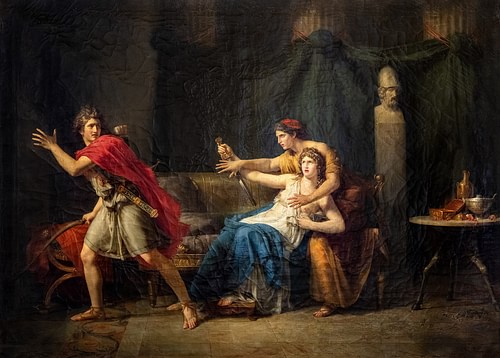
That's why you're here, to seduce me into
My father's holy marriage bed, you filth.
I'll sluice my ears with fresh running water
to wash away your words. How could I do
wrong, when just to hear your words makes me
unclean! Be sure, woman, only my righteousness
saves you. If I hadn't been trapped, unsuspecting,
by an oath, nothing could stop me from telling
my father.(Euripides, Hippolytus, 651-659).
Hippolytus planned to leave immediately while his father was away and swore that when he and his father returned, he would be watching every move both Phaedra and her nurse made. Phaedra was furious at her nurse and cursed her. Phaedra claimed that there was only one way to save her children's legacy and name: to die. Phaedra hung herself just as Theseus returned from consulting the Delphic Oracle. Theseus was distraught by his wife's death and begged to die as well. He read the tablet Phaedra had left behind, which claimed that Hippolytus had raped her. He called upon Poseidon to fulfil one of the three wishes he had granted him, asking him to kill his son. Hearing all the commotion, Hippolytus ran to his father to see what had happened. Theseus was furious and did not listen to Hippolytus' pleas or promises. He condemned him to a slow, painful death and exiled him.
After Hippolytus had his accident, another slave in Theseus' household came forward and defended Hippolytus' character to him, stating that he was too noble to be capable of anything Phaedra accused him of. Theseus told the slave to bring the dying Hippolytus to him out of respect for the gods. Artemis appeared to Theseus and told him the horrible truth. A gravely injured Hippolytus was brought back to his father's house. Upon seeing his son, Theseus wished he could revoke the curse and that he were dying instead of his son. Proving just how noble he was, Hippolytus forgave his father for his actions and died, leaving Theseus to curse Aphrodite for all the pain she had caused.
Aftermath & Legacy
In Pausanias' (c. 115 to c. 180 CE) Description of Greece, he wrote about Hippolytus' memorial mound that could be found in Attica. According to Pausanias, Hippolytus' death was caused by a curse, but it was common knowledge amongst the Greeks that the real reason for his death was Phaedra's passion for him and her nurse's crime. In Corinth, he revealed that Phaedra's tomb lay near Hippolytus' memorial.
In Phocis, he visited a grand building with paintings by the Greek painter Polygnotos. He claimed that Phaedra's death was symbolised in one of the paintings, which showed Ariadne sitting on a rock and watching her sister Phaedra on a swing. According to Pausanias, this may have had something to do with the Festival of Swings, which was an act of atonement for the suicide of a young girl.
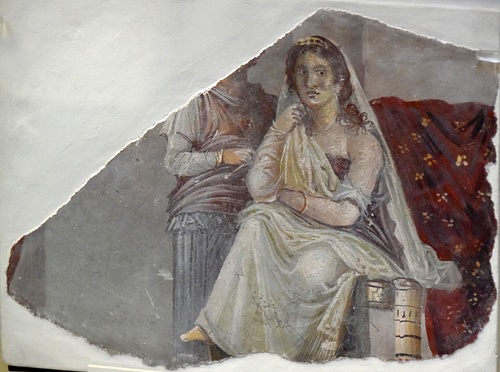
The tragic character of Phaedra is depicted in multiple works of art, literature and music, including plays and operas in French, Spanish, Italian, and Russian, the play Desire Under the Elms (1924) by American playwright Eugene O'Neill (1888-1953), the novel The Bull from the Sea (1962) by the English novelist Mary Renault (1905-1983), and True Love (2001) by the American playwright and historian Charles L. Mee, which is a modern retelling of Euripides' Hippolytus.
